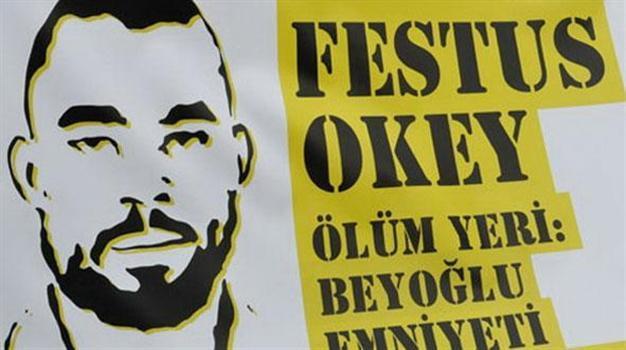Court upholds controversial verdict in killing of Nigerian refugee despite appeal ruling
ISTANBUL

Festus Okey was detained in 2007 for not carrying identification and died from a wound that was caused by a police officer’s bullet at the police post of the central neighborhood of Beyoğlu.
An Istanbul court upheld June 5 a previous verdict sentencing a police officer to four years in prison for “involuntary manslaughter” in the fatal shooting of Nigerian refugee Festus Okey.The previous ruling of Istanbul’s 21st High Criminal Court was overturned by the Supreme Court of Appeals on the grounds that judges rejected demands from lawyers to include Okey’s family as an integral party to the trial.
But the same Istanbul court ruled in unanimity to “resist against Supreme Court of Appeals,” refusing once again the demands for a retrial with the lawyers representing the Okey’s family as plaintiffs. The case will now be sent back to the Supreme Court of Appeals.
The ruling triggered vast outcry among associations, who slammed the court for protecting the police.
Okey was detained in 2007 for not carrying identification and died from a wound that was caused by a police officer’s bullet at the police post of the central neighborhood of Beyoğlu. His case could not proceed for four years as the court could not certify his identity after the defendant’s lawyers claimed that the Nigerian’s visa was fake, as well as the name.
The Migrants Solidarity Network (GDA), an NGO founded to help immigrants and refugees in Turkey which closely followed the trial, had made painstaking efforts to identify the family of the victim. Their lawyers eventually found the family and rushed Okey’s brother, Tochukwu Gameliah Ogu, to the 14th hearing of the trial held in November 2011. But the court rejected the application of the family to become a party to the trial at the next hearing on Dec. 13, 2011, while convicting police officer Cengiz Yıldız to four years and two months of prison.
Cameras said to be not working
Lawyers have repeatedly insisted that the verdict on charges of “involuntary manslaughter” was tantamount to a mere slap on the wrist, insisting that the outcome would have been different if the family had been allowed to become a party to the trial. They also stressed that the sentence given was one of the lowest for the charge filed against a police officer, as prosecutors initially asked for a jail sentence of between three and nine years.
According to Bianet, complaints were also filed against 110 other people who applied to become parties to the trial.
But the officer’s lawyer argued that the murder was caused due to the deficiencies in the police institution, particularly the lack of closets for storing guns. He said Yıldız kept his gun in his pocket and a sudden move between him and Okey might have caused the shooting. The defense also claimed that the cameras of the Beyoğlu police post where Okey was brought were not working at the time of the murder. Lawyers also accused the court of destroying evidence.
Before his killing, Okey had told police officers that he was intending to apply for asylum to the U.N.’s refugee agency, which would give him temporary protection in Turkey.
















